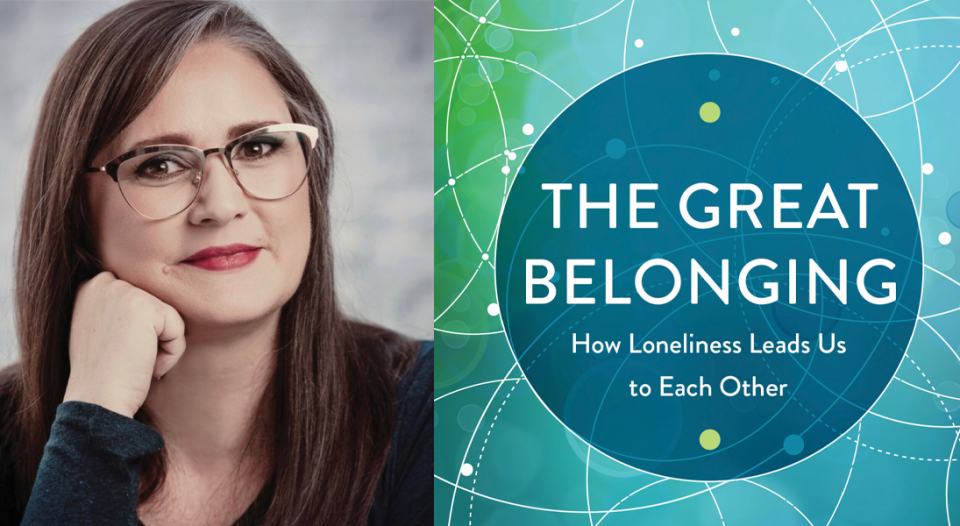No matter how many meaningful relationships we may have, it’s the rare person who doesn’t feel loneliness. Writer and spiritual director Charlotte Donlon’s new book, The Great Belonging (Broadleaf Books, 2020), explores loneliness, especially as it is felt by Christians. She uses research, personal stories, literature and visual art to get to the heart of the condition, rather than fix it or avoid it.
Living Lutheran spoke with Donlon about her book, where she sees loneliness in Scripture, her own relationship to loneliness, and what she thinks Christians can learn from being lonely.
Living Lutheran: Could you tell us about your book?
Donlon: The Great Belonging explores various angles of loneliness and belonging. We all experience different forms of loneliness, and the loneliness we feel might change based on our circumstances or our season of life. Many definitions of loneliness exist, so I don’t try to nail down one explanation or provide 10 ways to feel less lonely. Instead, I wander around the topics of loneliness and belonging with curiosity. I ask questions and discover a few answers. But some questions lead to more questions. Some questions can only be answered by acknowledging the role mystery plays in our lives and our faith.
What got you interested in exploring loneliness?
A few years ago, I had a specific experience within the context of Christian writing and publishing when someone told me that no one knew what to do with me or my writing. He didn’t mean it in a negative way—I think he actually meant it as a compliment. But when I heard those words, I knew they were true. He named something I had experienced my whole life. My belongings to others have never been very neat and tidy, so I have experienced a lot of isolation in different areas of life.
I began to read, write and speak about loneliness and belonging to better understand some of the ways I interact with others, God and the world around me.
Were you struck by particular biblical stories as you thought about loneliness?
When I think about loneliness, my strongest connections to Scripture are through the psalms. The psalmists put words around feelings I sometimes have trouble naming or explaining. The psalter touches on different points all along the spectrum of emotions and reminds me of some of the ways I belong to myself, others, God and the world.
I’m also comforted by the loneliness of Jesus. He knew loneliness in ways I will never know, but I know I’m not alone when I imagine the ways he was on the periphery, the sense of differentness he must have felt, and the isolation he experienced through rejection and betrayal.
When we inhabit a posture of curiosity, we discover loneliness doesn’t have to be scary.
You advocate for sitting with loneliness and seeing what it has to teach. What do you see as the benefits of this practice?
When we inhabit a posture of curiosity, we discover loneliness doesn’t have to be scary. Examining our loneliness helps us know more about the ways we belong. Being honest with ourselves about our lack of connection can also make us more aware of some gaps in our lives. Maybe we need to give more attention to our relationships. Maybe we need to notice the ways we move away from others and God.
And when we talk about our loneliness and belonging with others, we might find we aren’t as alone as we thought we were. These conversations also take away our shame and reduce the amount of power loneliness has over us.
Do you think that Christians are more or less prone to loneliness?
I believe Christians have a deeper sense of our separation from heaven. While we can have intimacy with God, we are still disconnected from God in ways that will eventually be removed. We also sense the separation we have with others and ourselves because of sin, brokenness and suffering.
What would you say to those experiencing loneliness, especially in this time of greater isolation?
The best thing we can do is talk about our loneliness with people who are likely to respond with love and understanding. It might seem awkward, but there’s a good chance those conversations will provide comfort and a greater sense of belonging for all parties involved.
Being in nature, reading good books, listening to music and journaling also help us connect with ourselves, others and God.
Finally, instead of trying to deny and avoid our loneliness, we can be curious, ask God what we need to learn from it, and try to notice ways we belong instead of only focusing on the ways we feel alone and isolated.
What are your hopes for your readers?
I hope The Great Belonging will show readers they aren’t alone. … I want this book to normalize loneliness and encourage people to have conversations with others. I want them to one day discover that loneliness has less power over them.






